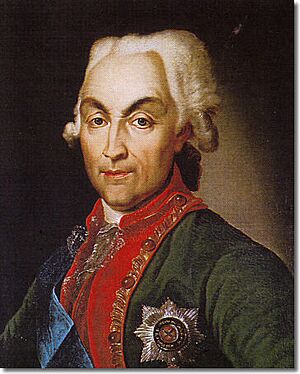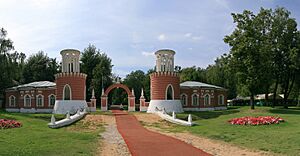Nikolai Vasilyevich Repnin facts for kids
Quick facts for kids
Prince
Nikolai Vasilyevich Repnin
|
|
|---|---|
 |
|
| Born | 22 March 1734 St. Petersburg, Russian Empire |
| Died | 24 May 1801 (aged 67) Riga, Governorate of Livonia, Russian Empire |
| Allegiance | |
| Service/ |
Imperial Russian Army |
| Years of service | 1749–1798 |
| Rank | Field Marshal |
| Battles/wars | |
| Awards | Order of St. Andrew Order of St. George Order of St. Vladimir Order of the White Eagle |
| Relations | House of Repnin |
Prince Nikolai Vasilyevich Repnin (born March 22, 1734 – died May 24, 1801) was an important Russian leader and general. He came from a powerful princely family. He played a big part in the history of the Polish–Lithuanian Commonwealth. He was also a successful military commander, known for his victory at the Battle of Măcin.
Contents
Nikolai Repnin's Early Life and Role in Poland
Nikolai Repnin was born in Saint Petersburg, Russia. He joined the Imperial Army at a young age. He served under his father, Prince Vasily Anikitovich Repnin. He also spent time abroad, where he received a good German education. Later, he fought in the Seven Years' War.
In 1763, Emperor Peter III sent him to Prussia as an ambassador. Soon after, Empress Catherine the Great sent him to Poland. There, he became a special representative, known as a minister plenipotentiary. This meant he had a lot of power to act on behalf of Russia.
At this time, Russia had a lot of control over the Polish government. Repnin was almost like the ruler of Poland. His main job was to create a group of supporters for Russia. He was told to make sure that Protestants in Poland got the same rights as Catholics. However, Repnin thought the Protestants were not strong enough to help Russia much. The Protestant community even asked Empress Catherine not to involve them.
To help Russia's goals, he encouraged different groups to form alliances called confederations. He supported Protestant groups first, then a Catholic one. Repnin himself didn't always like the political tasks he had to do. But he followed his orders. He used various methods to make the Polish parliament, called the Sejm, agree to Russia's demands in 1767–68. This meeting became known as the "Repnin Sejm". Before the Sejm, he even ordered the arrest and exile of some people who strongly disagreed with his plans. This led to the formation of the Bar Confederation, which was a rebellion against Russian influence.
Military Achievements
After his time in Poland, Repnin left his diplomatic role. He became a military commander in the war against the Ottoman Empire. He led his own troops in areas like Moldavia and Wallachia. In 1770, he stopped a large Ottoman army from crossing the Pruth River. He also showed great bravery in battles like Larga and Kagul. He successfully captured the cities of Izmail and Kilia. In 1771, he took control of Wallachia and occupied Bucharest.
Later, he helped capture Silistria in 1774. He also took part in the talks that led to the Treaty of Kuchuk-Kainarji, which ended the war. After this, he represented Russia's interests in the Ottoman capital for a couple of years.
When the War of the Bavarian Succession began, Repnin led 30,000 soldiers to Breslau. He then represented Russia at the peace talks known as the congress of Teschen. Here, he helped convince Austria to make peace with Prussia.
During the second war with the Ottoman Empire (1787-92), Repnin was one of Russia's most successful commanders, second only to Alexander Suvorov. He defeated the Ottomans at Salcia. He captured the entire camp of the Ottoman commander, Cenaze Hasan Pasha. He then trapped him in Izmail. Repnin was preparing to attack Izmail, but he was told not to. Later, Alexander Suvorov successfully stormed the city. In 1791, Repnin became the commander-in-chief. He quickly defeated the Ottoman army at Măcin. This victory forced the Ottomans to agree to a ceasefire.
Later Years and Legacy
After the Second Partition of Poland, Prince Repnin became the governor-general of the newly acquired areas in Lithuania. He also commanded the Russian forces there during the Kościuszko Uprising, a Polish rebellion.
In 1796, Tsar Paul I promoted him to the highest military rank, field marshal. In 1798, he sent Repnin on a special diplomatic mission. He was to try and convince Prussia to leave its alliance with France. He also wanted to unite the Habsburg monarchy (Austria) and Prussia against France. However, his mission was not successful. When he returned, he was removed from service. He died in Riga in 1801.
Nikolai Repnin had three daughters. He also had an illegitimate son named Ivan Pnin. When Prince Repnin died, his direct male family line ended. However, Tsar Alexander I allowed Repnin's grandson, Prince Nikolai Repnin-Volkonsky, to take on the Repnin name and his grandfather's family symbol.
See also
- Ambassadors and envoys from Russia to Poland (1763–1794)
- Ivan Pnin
 | May Edward Chinn |
 | Rebecca Cole |
 | Alexa Canady |
 | Dorothy Lavinia Brown |


